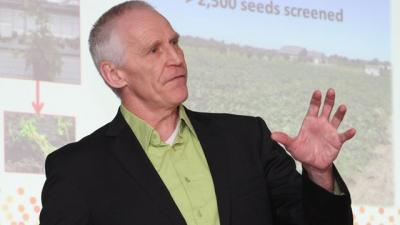
Developing products for niche markets could very well be the future of the local agricultural industry, according to experts in the field.
The concept, along with the latest innovations in farming and food, were presented at the third annual Halton Region Agricultural Forum Thursday night.
The event — held at Milton's Country Heritage Park — brought together about three dozen people interested in the region's agricultural industry, including farmers, politicians and food processors.
The evening kicked off with a presentation from Research Director Michael Brownbridge of the Vineland Research and Innovation Centre, located in Niagara's wine region. He showcased the centre's latest research on growing crops that aren't traditionally planted in Ontario or Canada, like okra, which is popular in many ethnic dishes.
With immigration expected to account for 2.2 million new Canadians by 2020, Brownbridge indicated that catering to their taste buds will open new doors for farmers.
"The largest ethnic group by 2017 will be from South Asia. They spend a proportionally larger amount of their budgets on vegetables," he explained. "There's a new opportunity here."
An increasing demand for locally-grown foods is also going to benefit area farmers, said Brownbridge.
"Produce of Ontario resonates with all consumer groups. We can compete with imports based on quality and freshness. We can also beat them on shelf life," he said. "The key for us now is improving production efficiency. We have to get a crop at the end of it that's price competitive in the marketplace."
It's these types of issues that drive research at the centre in Vineland, which is testing new hybrid varieties of okra, noted Brownbridge. The centre is also working to find a variety of sweet potato that can grow and survive in Ontario's climate.
"Consumption of sweet potatoes has domestically doubled over past five years. There's huge room for growth to meet this expanding market," he said.
But with sweet potatoes preferring the warmer climate of the southern United States, it's challenging for the province's farmers to successfully grow the crop and compete.
The research centre conducted on-farm trials last year and subsequent taste testing in an effort to find the "Ontario sweet potato."
"Screening can give us a faster way to get varieties and make them available to our growers," said Brownbridge.
Another unique market showcased at the forum came in the liquid variety. The Toronto Distillery Company was on hand to talk about how it's taking Ontario-grown organic grains and distilling them into whiskey.
"Growers now have the opportunity to showcase their crops in a giant marketplace like the LCBO," said Toronto Distillery Company co-founder Charles Benoit. "I just think the opportunity is really tremendous."
Unlike other distilleries, the new company is labelling its bottles with specific information on the crops used to produce the whiskey.
"I think we're at the beginning of something really exciting," he said. "Before, farmers didn't plug into the spirit market, but they will now."
While gluten-free products are certainly all the rage these days, a family company in the small town of Heidelberg, ON has been creating these types of specialty items for decades.
Kevin Stemmler, co-owner of Stemmler Meat and Cheese, told the audience about how his family's business made its way into the niche market that caters to diets free of gluten, MSG, lactose, nitrates and other allergens.
"This type of meat didn't exist in the '80s when we started," he said. "So how do we develop this market? Of course, we innovate."
For example, he said they use turkey, beef and pork collagen instead of soy in their products in response to soy allergies.
"There are a lot of innovative things we can do to help ourselves," he remarked.
Those in attendance also learned about the large variety of government funding opportunities available to the agricultural and food sectors through a presentation from Mentor Works, a consulting firm that assists farmers in accessing these funds.
For forum guests like Meaghan Richardson, co-owner of Mabel May Farms in north Burlington, the evening proved to be very informative.
"This certainly showed us where we can go with a good idea," she said. "There are definitely niches out there that Halton farmers can fill."
------------------------------------------------------- ------------------------------------------------------- ------------------------------------------------------- ---------------------------------
Detail Link :
http://www.insidehalton.com/news-story/5295317-innovation-and-opportunities-shared-at-halton-region-agricultural-forum/
